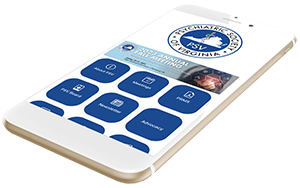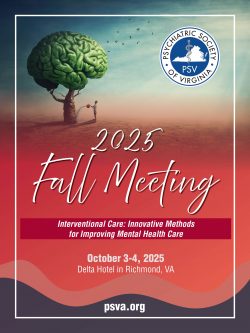Artificial Intelligence in Psychiatric Practice: Fantasy or Heresy
By John Luo, MD
The use of artificial intelligence in psychiatric practice is the new frontier. There are great opportunities and concerns with its use. AI began in the 1960’s with the ELIZA program developed by Joseph Weizenbaum at the MIT Artificial Intelligence Laboratory, which was a simple program that reflected support back to the user. The movie industry depicted HAL 9000 in the movie ‘2001 A Space Odyssey’ as a high risk for potential for malevolent and autonomous actions. IBM developed Deep Blue, a supercomputer that beat Gary Kasparov, the grand champion of chess in 1997.
The foundation of AI is based on Bayesian statistics, which helps update our belief about random events in light of seeing new data or evidence. It interprets probability as a measure of believability or confidence than an individual may possess about the occurrence of an event. With higher computing power over the last 15 years, AI in the form of large language models is better able to predict what words go with the answer to the question or prompt. Natural language processing and neural networks help the computer to figure out how to process data in human language, but ultimately, it does not understand language, facts, or ethics.
There are many implementations of AI in psychiatric care including generating progress notes as scribes, creating answers to patient questions, suggesting care plans and lifestyle modifications, and predicting suicide risk. Psychiatrists should be mindful of the impact of using AI scribes in patient care, which includes asking for consent, but also processing the impact on the patient-physician relationship in terms of whether the patient is truly consenting and, if in doing so, does the patient perhaps not disclose fully what they would say without the scribe. Concerns also exist with the use of generative AI, in particular what are called hallucinations where the large language model generates non-sensical or inaccurate replies to prompts/questions as its programming attempts to predict the answer but is unable to understand whether the answer produced is correct.
There is great promise with the use of AI, but just like any tool, it has its strengths and weaknesses, and it is up to us as medical practitioners to use it appropriately with our patients.
Your Online Identity: Privacy and Professional Implications
By John Luo, MD
The Internet has a vast treasure trove of information about you, some of which may be generated by you, your organization, or someone else who happens to upload it. That information may be in the form of a blog post, comment on social media, photo sharing website, or even a YouTube video that you had no idea existed. In general, most information about you is likely professional and positive in nature, such as a presentation or perhaps an award that you have received.
However, it does not take more than one false step to ruin your career. An example is how Anjali Ramikissoon, MD, at the time a fourth-year neurology resident at Jackson Health System, was filmed on video attempting to get into the wrong Uber ride and then assaulted the driver (https://abcnews.go.com/US/miami-doctor-accused-attacking-uber-driver-calls-biggest/story?id=36542246).
She was initially put on probation and eventually let go from her residency training program. How does one protect one’s online identity and privacy? It is an active process to discover what information is available online about you. We all know about and use search engines such as Google, but there are patient physician rating sites such as RateMDs.com and Healthgrades.com which may have damaging reviews from disgruntled patients. If that were not scary enough, people search engines such as TruePeopleSearch.com and Zabasearch.com that uncover and reveal much more personal and what one thought was private information. Photo sharing sites such as Picasa.com might have tagged photos unbeknownst to you. Even Amazon reviews and your wish list may reveal too much information that can be used to zero in on your profile.
Discovery is an important process, so use Google.com/alerts to know at least what information people are reading about you even if you don’t know who is searching. Google is a great search tool, but it is also gathering information about what you are looking for and sending it your way. Startpage.com and DuckDuckGo.com may be better search engines to use as they provide less tracking online. The Electronic Frontier Foundation has a number of tools to protect your privacy including ‘Privacy Badger’, a browser add on that stops advertisers and trackers and ‘Cover Your Tracks’, an analysis tool to see how well you are protected. If you wish to utilize a service to manage your privacy, ReputationDefender.com and JoinDeleteMe.com are services to consider.
Privacy settings that share location, access to camera, and access to the microphone should be reviewed on the smartphone. Apps may be sending your data to unscrupulous websites, so check out what they are doing using the App Privacy report in iOS and using the Privacy Dashboard app for Android. With regards to unflattering reviews, if they are legitimate with regards to your constant tardiness or lack of responsiveness to calls, many sites offer a ‘premium’ service that will float your profile higher than others while also burying negative reviews lower. Such a service does come at a premium cost of over a thousand dollars. If the review is scathing and ranting but without any substance, contact their help center as they will likely remove such reviews because they are not reasonable feedback and actually damage their website as a forum for reasonable and fair opinions.
Digital Addiction: The Impact on Mental Health
By Sachinder Vasudeva, MD
The presentation on “Digital Addiction: Impact on Mental Health” discussed the epidemiology of, and social and biological effects of problematic use of, digital media. While digital devices do have a lot of benefits, research suggests impairment of attention as a consequence of digital addiction, and association with depression and anxiety. Research also suggests that excessive/problematic use of digital devices leads to changes in the brain that are often seen with impulse control difficulties. Reports from research about behavioral and pharmacological treatment options were also reviewed.
Mental Illness Patient Diversion to an Empath Unit
By Peter Betz, MD
Patients with psychiatric illnesses often frequent the Emergency Department. Although we provide the best care we can in that setting, the ED is generally not designed around the needs of a patient with mental illness. An EmPath Unit is one solution that allows diversion of these individuals to a setting more conducive to the care and support for patients with mental illness. As it is often integrated into or next to an ED, the capital investment can be minimized and the integration of psychiatric and emergency medical care can be maximized. It is financially sustainable and demonstrates multiple positive quality outcomes.
The Potential Use of Artificial Intelligence in Differential Diagnosis in Psychiatry
By Delmar Short, MD
Psychiatry has 297 different diagnoses in DSM-5, each with tables of numerous diagnostic criteria, rule outs, and differential diagnoses. Misdiagnosis is common in all of medicine, with approximately one third diagnostic errors in general, and primary care errors in mental health range from 66% to 98%.
Language models have been attempted for at least four decades and continue to be refined. Algorithmic attempts at differential diagnosis are also a possibility and have been attempted for a similar number of decades.
Neurocognitive disorder errors are particularly common in my experience, and we have discussed acrostic mnemonics that may be helpful for these and other diagnostic criteria.
AI in Residency
By Janie Lozovski, DO; and Brian E. Wood, DO, DFAPA
The human touch is still extremely important. Dr. Wood and Dr. Lozovski presented a lecture detailing how Artificial Intelligence has impacted the psychiatry residency application. This lecture reviewed the history of residency, provided an overview of their own research, and discussed how AI will shape the psychiatry residency application in years to come.





